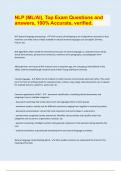Tentamen (uitwerkingen)
NLP (ML/AI), Top Exam Questions and answers, 100% Accurate, verified.
1 keer bekeken
0 keer verkocht
NLP (ML/AI), Top Exam Questions and answers, 100% Accurate, verified.
NLP (natural language processing) - -NLP consists of developing a set of algorithms and tools so that machines can make sense of data available in natural (human) language such as English, German, French, etc.
NLP algorit...
[Meer zien]
Voorbeeld 2 van de 8 pagina's
-
13 juni 2023
-
8
-
2022/2023
-
Tentamen (uitwerkingen)
-
Vragen en antwoorden
Alle documenten voor dit vak (8)
NLP (ML/AI), Top Exam Questions and
answers, 100% Accurate, verified.
NLP (natural language processing) - ✔✔-NLP consists of developing a set of algorithms and tools so that
machines can make sense of data available in natural (human) language such as English, German,
French, etc.
NLP algorithms often model the hierarchical structure of natural language i.e. characters form words,
words form phrases, phrases form sentences, sentences form paragraphs, and paragraphs form
documents.
Although there are traces of NLP research since a long time ago, the concept got well defined in the
1950s, with the breakthrough research work of Alan Turing and Noam Chomsky.
natural language - ✔✔-Refers to the medium in which humans communicate with each other. This could
be in the form of writings (text) for example emails, articles, news, blogs, bank documents, etc or speech
for example lectures, speeches, audio calls, etc.
Common applications of NLP - ✔✔-- document classification: classifying textual documents and
assigning it one or multiple categories.
- document clustering: find similar documents and segregate them to form groups.
- sentiment analysis: classify text for different sentiments ranging from negative to neutral to positive.
- document summarization: extract the most important and central ideas in a document.
- named entity recognition (entity extraction): identifies names entities and classifies them into
categories such as person, organization, location, etc.
- question answering: intelligent systems that generate responses to the questions being asked by the
user.
- machine translation: automatically translating from one natural language to another.
Natural Language Understanding (NLU) - ✔✔-NLU enables machines to understand the intent or the
meaning of the text.
, This involves the following levels of analysis:
1. Morphological
2. Syntactic
3. Semantic
4. Discourse
Morphological analysis (NLU) - ✔✔-Is the analysis of the structure of individual words.
A morpheme is defined as the "minimal unit of meaning". For example, the words "care", "cares",
"caring", "careless", "careful", "uncaring" are different forms of the same word, with stem "care". Also
note that the structure of a word could include a prefix ("un-" in "uncaring") or a suffix ("-less" in
"careless").
Morpheme - ✔✔-A morpheme is defined as the "minimal unit of meaning". For example, the words
"care", "cares", "caring", "careless", "careful", "uncaring" are different forms of the same word, with
stem "care". Also note that the structure of a word could include a prefix ("un-" in "uncaring") or a suffix
("-less" in "careless").
Syntactic Analysis (NLU) - ✔✔-(Also called parsing) involves analysis of words in the sentence for
grammar.
Semantic Analysis (NLU) - ✔✔-Uses morphological and syntactic knowledge to understand the meaning,
intent, and purpose of the text as a whole.
This is necessary since grammar leaves a lot of ambiguity, and we implicitly rely on shared
understanding of the world to communicate with each other.
For example, consider the two sentences "I went to the market in my shorts" vs "I went to the market in
the city". In terms of grammer (syntax) the two sentences are equivalent. However, based on semantics
(meaning), we know that "in my shorts" refers to "I", whereas "in the city" refers to the "market".




